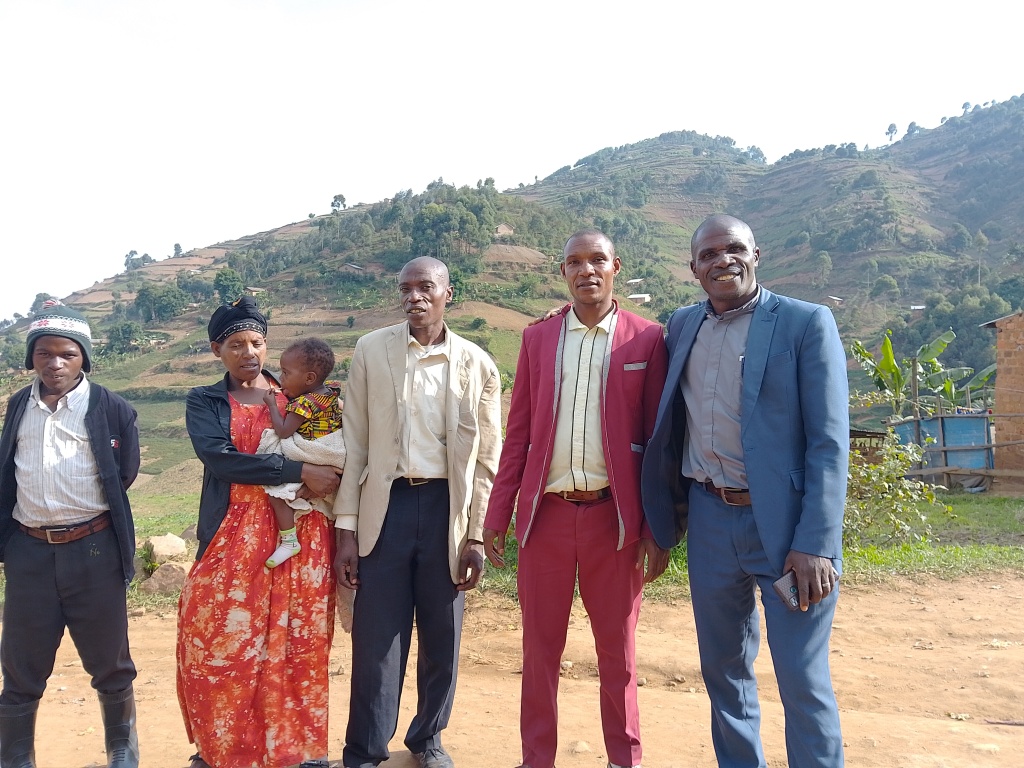After landing the first couple of days were a joyful reunion with some friends from my gap year, Joshua and Dianah. I actually attended their wedding in that time and they now have four children. It was lovely to catch up, see how much the children have grown over the past year and meet the youngest one for the first time! Although he’s only 4 months old, he’s HUGE and not far from sitting up! Dianah says it’s much hard work keeping up breastfeeding him!
Then came time for the journey down to Kabale (far South-West). This took a rather longer than expected! In Uganda, if a bus (think long-distance coach) hasn’t filled up by the scheduled departure time, it hangs around to wait and see if anyone else is coming. This does mean that prices are kept as low as possible and generally isn’t a major problem as the companies only run as many buses as they can fill. However, apparently very few people are traveling anywhere at the moment, which meant Pastor Justus (pastor of the church I attended on my gap year and native to this area) and I sat on the bus for three hours before it left (and it still wasn’t full!), therefore we arrived in Kabale town much later than expected and after the last taxi had gone out to the village. (Ugandan taxis operate like UK buses, where there are several unrelated people in the vehicle at once and each person pays for themself.) This meant an overnight stay in a hotel, and a wait for the taxi to fill up the next morning. Most Ugandan taxis are Hiace vans converted to minibuses but the ones going out to this village are all 5 seater cars, which of course aren’t actually full before they’ve got at least 7 people in them. I think this particular one peaked at 9! Fortunately, the state of the roads means they rarely get above 20mph!
The classic Ugandan rough journey contrasts with the apparent serenity of the classic Ugandan village. The scenery here always reminds me of the Yorkshire Dales but with a very distinct Ugandan flavour (which makes it even better in my view!). The wildlife is stunning: lizards, small birds in droves (including swifts on migration), beetles and even an eagle! This is all part of the Rwenzori Mountains, which most tourist literature for Uganda will mention and is not hard to see why.

The altitude though does bring rather changeable weather. In the sun, it can reach into the 20s and be very pleasant. However, in the rain it can get down to the low teens which does feel rather chilly (and makes it quite hard to dress for both!). My chunky knit cardis, thermal leggings and fleece have all been appreciated.
Our friend and host Alex has made sure we have been very well looked after! Hospitality is greatly valued in. Uganda and his shop that sells everything from haircare and hardware to glue and groceries has apparently really taken off in the last couple of years which meant having some little unexpected luxuries, like having charging points in the house, meat a couple of times and having my own bedroom.
However, dig a little deeper, there is a much darker reality. Alcohol abuse is more common here than central Uganda, with many men leaving their wives to both grow the family’s food and keep the house running. I even saw a lady on the way to her allotment only 3 days after giving birth to twins. One was carried on her back and the other by an older sibling. Very few children go to school in this area and, unusually, education is not seen as desirable by many families. This has eerie echoes of the Karimojong that I’ll be working with in Kotido – eerie because they are at opposite ends of the country, with generally more positive traits in between.
Furthermore, the local area has been hit with significant tragedy over the past week. We arrived to the news that one of the men had gone to look for work in town and had been knocked down by a moving vehicle and died instantly. He leaves behind a toddler and sixteen year old widow who buried a stillborn child on the same day as her husband. A few days later and a seven-year-old dies collecting firewood when she trips and hits her head on a stone. It’s the very grim reality of living in a country that gives little regard to daily health and safety.
It is against this backdrop that we find the church that I had come to visit. A glimmer of hope, it has become well established, despite some early difficulties finding a meeting place. There are a number of people with encouraging testimonies of how they came to know Jesus, many of them leaving behind a life of ancestor worship and small gods.
The church is far from perfect: there’s a bit too much showmanship in parts of the worship for my liking, I’d like there to be more exposition of the biblical text in the sermons and I don’t think the way they take the tithes is biblical. Moreover they apparently have some services that last over 6 hours!! I was delighted though when one of the new Christians asked me if I’d buy him a Bible in a language he understands. He has been mocked by the community for changing his beliefs later in life but it seems to have only made him more enthusiastic about church life.

We are now on the overnight bus, when I’ll arrive back to spend some more quality time with Joshua, Dianah and the children.
